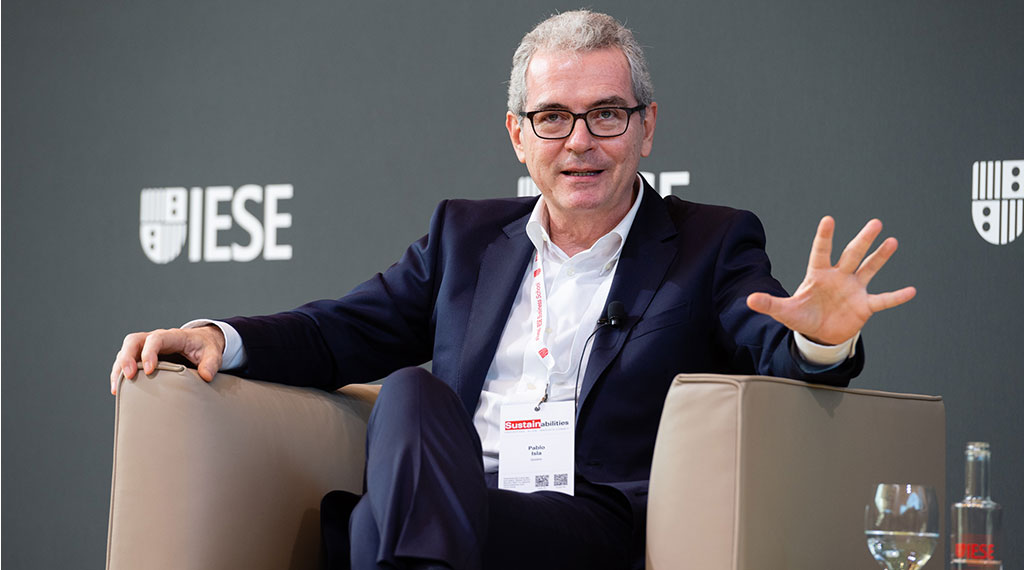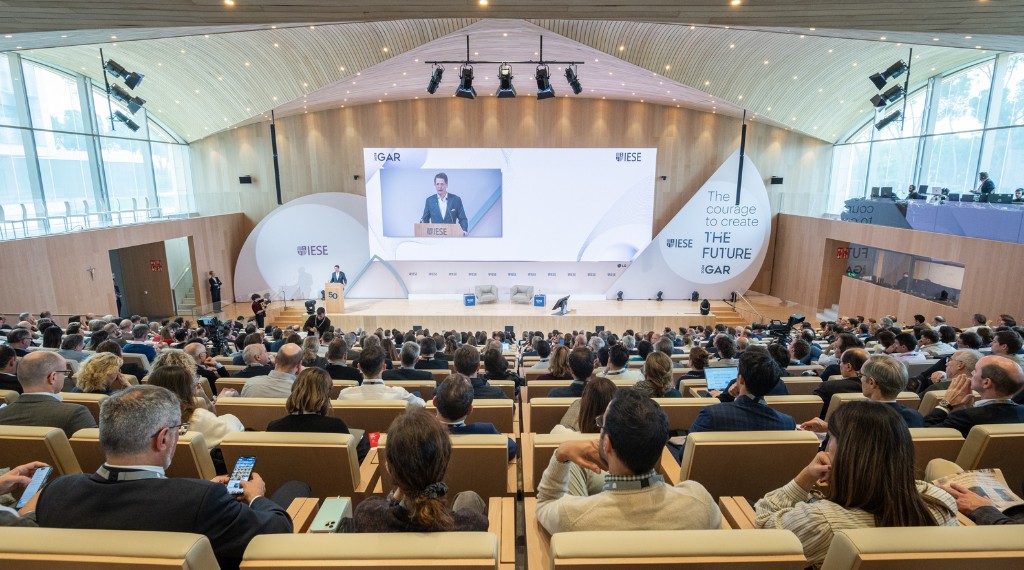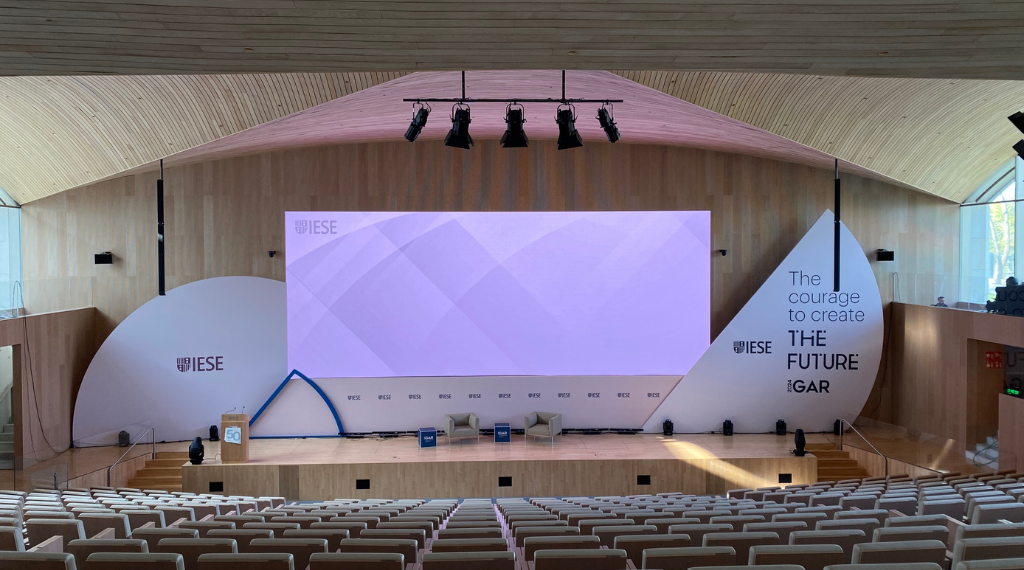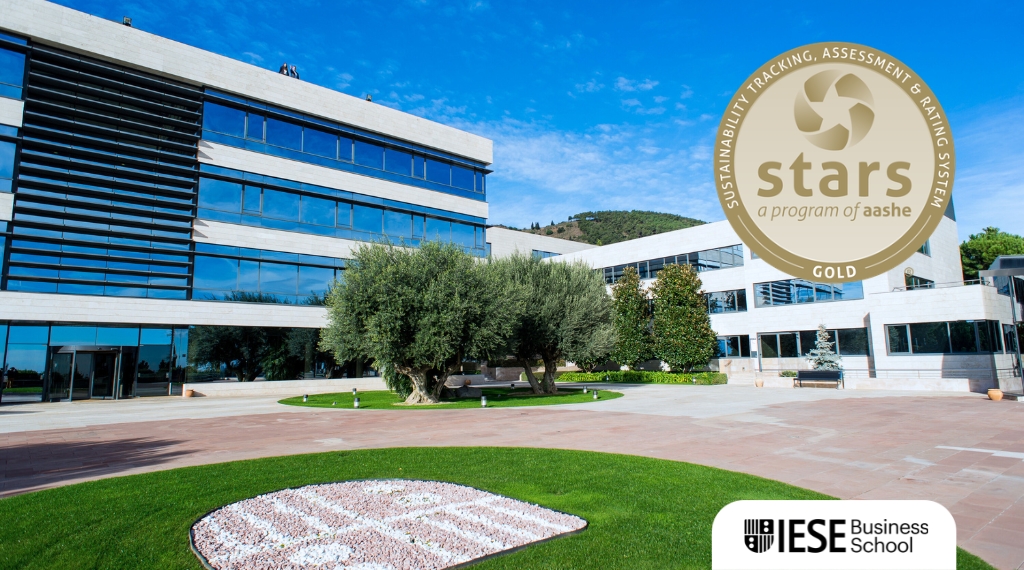Stories
As Global Alumni Reunion 2021 ends, push for sustainable business grows
Thousands gather in Madrid and online for powerhouse annual event
Pablo Isla, Executive Chairman of fashion behemoth Inditex, speaks at IESE’s Global Alumni Reunion 2021 in Madrid.
Photo: Javier Arias
November 14, 2021

IESE’s Global Alumni Reunion 2021 came to an end with calls for immediate, collaborative and comprehensive action to put sustainability at the core of business.
The Alumni Reunion was held Nov. 11-13 and featured two days of sessions by more than 35 groundbreaking policy and business leaders; the third day was reserved for sporting and cultural activities. With more than 5,000 people registered to attend, it was held on IESE’s new Madrid campus and online, with innovative options to follow the event and connect with other alumni.
The theme of the Reunion was “sustain-abilities,” highlighting the need not only to embed sustainability in the business agenda, but also to train leaders with the skills and the knowledge to put change into practice.
“Sustainability is at the heart of IESE’s view of good management,” Dean Franz Heukamp said at the opening. “We talk about long-lasting positive impact and we cannot imagine a manager or leader who does not deeply care about sustainability.”
Throughout two days of sessions, it was clear that sustainability has moved far beyond a narrow definition of minimizing damage to the environment. Instead, it has to do with businesses that thrive over time, improving the lives of the people within their reach and the places where they are present. Sustainable business is a rejection of short-term gains that disregard the health of the world today and tomorrow.
“In the history of humanity, the issue of sustainability has never been more crucial,” said Alejandro Beltrán, president of the IESE Alumni Association.
New sustainability mindset
The climate emergency requires a fundamental shift in mindset, and for business leaders to consider values such as the common good, inequality and justice, not to mention planetary repair.
For Harvard Prof. Michael Sandel, that means abandoning long-held notions of meritocracy. “The alternative is a public life, a way of conceiving society, that focuses less on arming people for meritocratic competition and focuses more on making life better and more decent for everyone who contributes to the common good, whether through the work they do, the families they raise, or the communities they serve.”
And business leaders should embrace ideas such as stakeholder capitalism without fear. “Stakeholder capitalism is capitalism. It is a way of doing business, not a repudiation of it,” said Vivian Hunt, senior partner at McKinsey, urging businesses to identify who all their stakeholders are, what their needs are, and how they can be met.
For author John Elkington, recent changing mentalities are grounds for optimism. “I have never been more optimistic that change will now start to happen in ways that we have been hoping for for a very long time. Because once the order, the system which people have grown up in and knew how to operate starts to shift, starts to almost decompose all around them, people will open up in ways that we haven’t seen.”
Sustainability in operations
But beyond the mindset, concrete action must be taken by companies. The event offered perspectives on the fashion industry from the heads of two very different companies: Pablo Isla, Executive Chairman of global giant Inditex, and Javier Goyeneche, founder of sustainable clothing line ECOALF.
Both agreed that the industry must be more sustainable. “Inditex is a large company in the sector, and as such has the obligation to push the industry towards sustainability,” Isla said. Goyeneche echoed: “If we are not part of the solution, the fashion industry will be part of the problem.”
But how? Innovation in this and other industries will be key. That includes developing greener fabrics, discovering different raw materials and inventing new recycling processes. It also involves establishing labelling standards to tag greener fabrics, consistent reporting standards, and industry-wide cooperation.
Consumers meanwhile can do their part by giving sustainable companies their business – and in fact already are. The idea that consumers are demanding sustainability came up among many different speakers, including Telefónica Chairman and CEO José María Álvarez-Pallete. “In our case, there is no longer any customer who does not demand digitalization and sustainability,” he said.
So did the idea that information, standards, metrics, reporting and labelling must be transparent and accessible. “Measuring advances is the most technical and critical step for a company to become more sustainable,” said Juvencio Maeztu, Deputy CEO and CFO of Ingka Group.
There were also many calls for what Halla Tómasdóttir, CEO The B Team, termed “radical collaboration” – among companies, between companies and the public sector, and across sectors. “Brave leadership in the private sector is essential. But it’s not enough. We need government,” she said.
That all-encompassing view will expand the impact. “This is not just an energy transition,” said Francesco Starace, CEO of Enel Group. “It starts with energy and ends with everything else.”
Sustainability in finance
Just as there was much discussion of finance at the recent COP26 conference in Glasgow, the Alumni Reunion also looked at the fundamental role of financing in sustainability.
Capital markets must reward companies that are dedicated to sustainable models, and punish those that are not, speakers said. Banks and large asset managers must also take ESG criteria into account when making loan and investment decisions.
Citi CEO Jane Fraser said the banking industry must take an active role in the green transition: “I’d say our role is about being active agents, driving and helping aid our clients transition from more fossil-fuel intensive technologies to cleaner technologies.”
“As investors, our role is educating our clients in why we think they need to transition,” echoed Stephen Cohen, Head of EMEA at BlackRock. “This is not an easy thing to do.”
But capital markets and companies are not always on the same page. “It’s ideal if capital markets and business move in the same direction and at the same pace. But I see there’s a mismatch at the moment,” said Hiromichi Mizuno, the UN Special Envoy on Innovative Finance and Sustainable Investments, and former head of Japan’s massive government pension fund.
Responsibility of business schools in sustainability
Another theme of the reunion was the responsibility of business schools in promoting sustainability.
As part of the Alumni Reunion, IESE announced the creation of a Sustainable Leadership Initiative, led by Prof. Fabrizio Ferraro, which groups research and teaching in the area. It also established an Alumni Sustainability Chapter to ensure that alumni working in the sustainability space receive the support and networking they need. IESE is also one of eight leading European business schools taking part in a new Business Schools for Climate Leadership initiative.
Isabel Díaz Ayuso, President of the Community of Madrid, said in a speech at the closing of the conference that educational institutions such as IESE are important in developing the knowledge and talent needed to take on global challenges. “This (IESE) contributes a lot of value to the Community of Madrid,” she said.
In opening the event, Madrid Mayor José Luis Martínez-Almeida highlighted IESE’s commitment to talent, excellence, innovation, openness and values. But that educational excellence carries with it responsibility for alumni, he said: “You all have the obligation to give back to society the opportunities that you have been given.”














